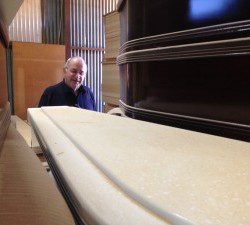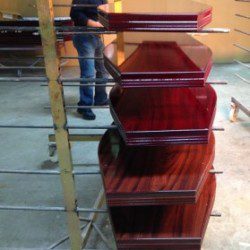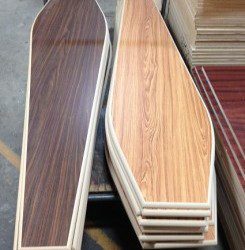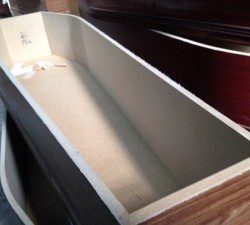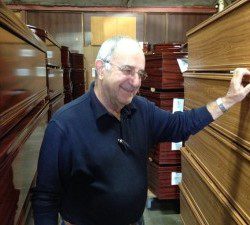Coffins and caskets are stacked high in the storage area.
There are narrow corridors between the stacks, which are wide enough for a grown person to walk between them.
It’s similar to being in a furniture warehouse’s chest drawers’ section.
But seeing rows and rows of chests of draws doesn’t make you visualise what people do with them.
Coffins do.
No matter how hard you try to push back thoughts of their ultimate function they just keep coming back.
I’m on a tour of George Ajkay’s Beta Caskets factory, including his two large storage areas that combined can hold around 1,600 coffins and caskets.
About 25 people are employed by this south west family business which every year makes between 8,000 and 10,000 coffins and caskets.
They also make around 1,500 ash urns.
Mr Ajkay tells me that they also import caskets to cater for those who want to do something different for their dear departed.
“Here is one,’’ he says, pointing to a casket with a fairly elaborate design, both on top and on the sides.
The basic difference between coffins and caskets is design, with caskets used where a viewing of the deceased is part of the funeral.
Mr Ajkay’s tour begins at the start, the delivery dock where the timber arrives, and we finish at the end, where a worker is spraying a coffin with lacquer and then hangs it for drying, which takes about 24 hours.
“We could make a coffin from scratch in 3-4 hours,’’ he says.
♦ George Ajkay is a quietly spoken man who looks much younger than his age – if he had said he was 56 I would have had no problem believing him.
“Add 10 years to that and a bit more after that,’’ he says.
But age is only a number and what we really want to know is what it’s like to be a man who makes coffins for a living.
Let’s start with what do you tell people when they ask you what you do?
“I say I’m in the furniture manufacturing business, you never know a person’s circumstances.”
Although Mr Ajkay established Beta Caskets in the late 1980s, he had been involved in coffin making before when he bought into a factory at Greenacre in the 1970s.
After a four year break from the coffin and casket business he returned to it and Beta was the result.
It is now a highly respected manufacturer of coffins and caskets in an industry that’s undergoing quite a bit of change.
While Beta is one of around half a dozen manufacturers in NSW, there are many other places one can get a coffin from these days, including giant USA store Costco.
Mr Ajkay though nominates Chinese imports as one of his family company’s current challenges.
“They’re cheap and nasty,” he says of imported Chinese coffins.
A search on the internet does not take long to confirm Mr Ajkay’s call.
There are gaps in the coffins that allow people to see inside, or even worse, some are so flimsy they can fall apart.
It comes as no surprise to hear Mr Ajkay tell me that coffins are getting bigger because, well, we humans are getting a little bigger.
“Not that long ago the average coffin or casket was 5 foot eight inches long [1.72m] and 18 inches wide [45cm].
“Now the average coffin is 6ft [1.83m] by 20 inches [50cm],’’ he says.
♦ We are sitting in Mr Ajkay’s office and he asks if I have planned my funeral.
When I sheepishly answer “no’’ he smiles, no doubt because he knows I am like most people: I’d rather not think of my demise, thank you very much. Let it come when it may but I won’t think about it now, I’m too busy trying to Google was it Gregory Peck or Humphrey Bogart in The Maltese Falcon or writing profound thoughts in 140 characters on Twitter or posting a picture of my lunch on Facebook or some other ridiculous post modern activity.
“Well, I have,’’ he says.
“But I won’t tell you which funeral director I will go to when the time comes.
“That’s because there are many good funeral directors who really care for you.
“Things have changed a lot since then,’’ Mr Ajkay says.
♦ He’s not a carpenter by trade but George Ajkay likes to wander into the factory floor and have a little dabble in the making of coffins and caskets.
“Not being a carpenter means I am not being constrained as someone who has been trained in that,’’ he explains.
“So I can look at various things in a different way from how a carpenter would.
“You can look out of the square to find an answer to a problem,’’ he says.
♦ So, what’s it all about then, Mr Ajkay, the fancy coffins and caskets and funerals that cost a small fortune.
“It’s about closure for those close to the dear departed; it helps reduce the grieving process from possibly weeks and months to a much shorter period depending on the circumstances.’’
Mr Ajkay, who lives at Glenfield with his wife, and is also on the board of directors of the Liverpool Catholic Club, is not sure what will happen to the company once he calls it quits – not that he’s planning to do that anytime soon.
Both of his children are very successful professionals and are unlikely to step in to run Beta Caskets.
“I don’t know what will happen,’’ he says.
But in the meantime he will just keep making something for which the demand will never cease.
“Everybody dies once,’’ he says.

